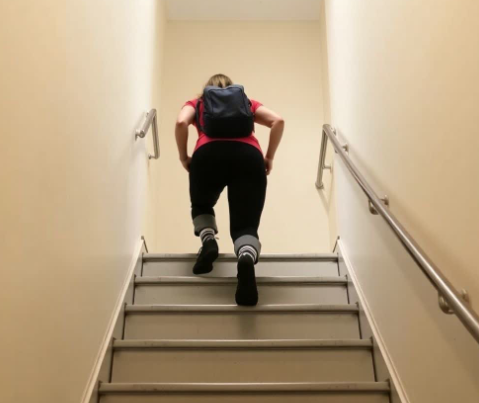Elevating Health: Why Climbing the Stairs Is a Powerhouse for Your Body and Brain
(Source: BBC Future)
Introduction: The Unsung Hero of Daily Exercise
In a world increasingly dominated by sedentary lifestyles and automated conveniences, a simple, often overlooked activity holds immense power for our physical and cognitive well-being: climbing stairs. Far from being a mere mundane task, ascending a flight of stairs offers a potent, low-impact workout with a surprisingly broad spectrum of health benefits. As highlighted in a recent article in BBC Future, opting for the stairs instead of the elevator or escalator can significantly contribute to a healthier body and a sharper mind. This seemingly small decision, made consistently, can be a game-changer for overall vitality.
 |
| Climbing the Stairs Is a Powerhouse for Your Body and Brain |
The Physical Fortitude: Building a Stronger Body
The physical advantages of stair climbing are multifaceted and compelling, addressing several key aspects of fitness and long-term health.
· Cardiorespiratory Fitness Enhancement: At its core, stair climbing is a fantastic cardiovascular exercise. Each step up requires your heart to pump harder to deliver oxygenated blood to your working muscles. This consistent effort elevates your heart rate and breathing, effectively strengthening your heart and lungs. Over time, this translates to improved cardiorespiratory fitness, which is a crucial indicator of overall health and longevity. Regular stair climbing helps to increase your body's efficiency in using oxygen, leading to better endurance in all physical activities.
· Reduced Risk of Cardiovascular Disease: The benefits to your heart go beyond just fitness. Studies have consistently demonstrated a strong link between regular stair climbing and a reduced risk of cardiovascular disease, including serious conditions like heart attack and stroke. One notable piece of research suggests that climbing more than five flights of stairs daily (equivalent to roughly 50 steps) is associated with a significantly lower risk of atherosclerotic cardiovascular disease, a condition where plaque builds up in the arteries. This simple habit can contribute substantially to keeping your arteries clear and your heart healthy.
· Lower Body Strength and Power: Climbing stairs is a compound exercise that engages multiple muscle groups in your lower body simultaneously. Your glutes, quadriceps, hamstrings, and calves all work in unison to propel you upward. This builds functional strength, which is vital for everyday movements like standing up, walking, and lifting. Unlike flat-ground walking, the vertical motion of stair climbing forces these muscles to work against gravity more intensely, leading to greater strength gains and improved power.
· Enhanced Balance and Stability: The act of navigating stairs requires continuous adjustments to your balance. As you shift your weight from one foot to the other and lift your body against gravity, your core muscles and proprioceptive system (your body's sense of its position in space) are constantly engaged. This repeated challenge to your balance system is particularly beneficial for older adults, helping to improve stability, reduce the risk of falls, and maintain independent mobility as they age.
 |
| Climbing the Stairs Is a Powerhouse for Your Body and Brain |
The Cognitive Boost: Fueling a Sharper Mind
Beyond the visible physical benefits, mounting evidence suggests that stair climbing offers profound advantages for brain health and cognitive function.
· Improved Blood Flow to the Brain: Physical activity, especially that which elevates heart rate, increases blood flow throughout the body, including to the brain. Enhanced blood flow ensures that brain cells receive a consistent supply of oxygen and essential nutrients, which are vital for optimal cognitive function. This increased circulation can support neural health and potentially protect against cognitive decline.
· Positive Impact on Cognitive Abilities: Research has begun to uncover direct links between physical activity, including stair climbing, and various cognitive abilities. Studies indicate that individuals who regularly engage in such activities tend to show improvements in:
o Problem-solving: The ability to think through challenges and find solutions.
o Memory: Both short-term and long-term recall.
o Creative Thinking: The capacity to generate new ideas and approaches.
o Attention and Focus: The ability to concentrate on tasks and filter out distractions. The exact mechanisms are still being explored, but it's believed that exercise fosters the growth of new brain cells, enhances neural connectivity, and increases the production of brain-derived neurotrophic factor (BDNF), a protein crucial for brain health and plasticity.
· Stress Reduction and Mood Enhancement: Physical activity is a well-known stress reliever. Climbing stairs can serve as a quick way to release built-up tension and improve mood. The release of endorphins during exercise creates a sense of well-being, while the focus required for the physical task can offer a temporary mental break from daily stressors, contributing to overall mental resilience.
 |
| Climbing the Stairs Is a Powerhouse for Your Body and Brain |
Accessibility and Integration: Making Stairs Your Daily Ally
One of the most appealing aspects of stair climbing as an exercise is its inherent accessibility and ease of integration into daily routines. Unlike going to a gym or committing to a lengthy outdoor run, stairs are virtually everywhere – in homes, workplaces, public buildings, and transportation hubs.
· A Simple Way to Elevate Heart Rate: It offers a simple, convenient way to achieve a moderate to vigorous intensity workout without requiring specialized equipment or a significant time commitment. Even just a few flights can make a difference in elevating your heart rate and getting your blood pumping.
· Daily Micro-Workouts: By consciously choosing stairs over elevators or escalators whenever possible, individuals can accumulate "micro-workouts" throughout their day. These small bursts of activity, when combined, contribute significantly to meeting daily physical activity recommendations and can have a cumulative positive impact on overall health.
· Inspiring Feats: The power of stair climbing is perhaps best exemplified by remarkable achievements like Sean Greasley's world record. He ascended and descended the equivalent height of Mount Everest on stairs in an astonishing 22 hours, 57 minutes, and two seconds. While such extreme feats are for elite athletes, they underscore the incredible endurance and physical conditioning that stair climbing can build, demonstrating its potential far beyond a simple daily habit.
 |
| Climbing the Stairs Is a Powerhouse for Your Body and Brain |
Conclusion: Step Towards a Healthier Future
The humble staircase, often overlooked in our pursuit of modern convenience, stands as a powerful and accessible tool for enhancing both physical and cognitive health. From improving cardiovascular fitness and building lower body strength to sharpening memory and fostering creative thinking, the benefits are expansive. As we look to future-proof our bodies and brains, embracing the simple act of climbing the stairs emerges as a smart, efficient, and highly effective strategy. So, next time you face a choice between stairs and an elevator, consider taking the path that promises a healthier, more vibrant you one step at a time.
Labels: Elevating Health: Why Climbing the Stairs Is a Powerhouse for Your Body and Brain


0 Comments:
Post a Comment
If you have any doubt, please let me know
Subscribe to Post Comments [Atom]
<< Home